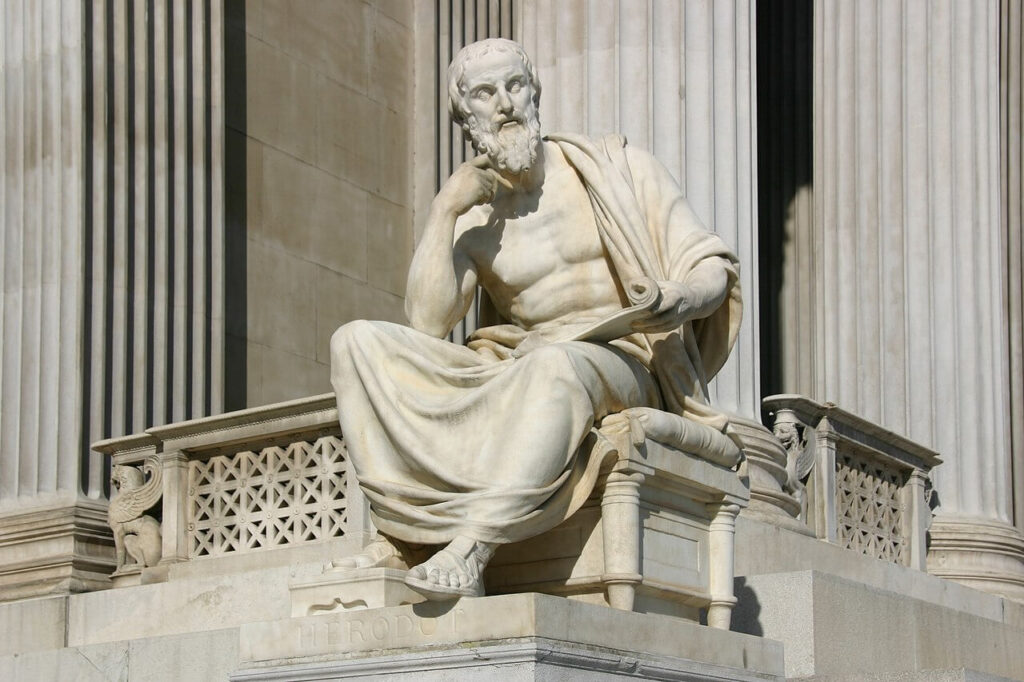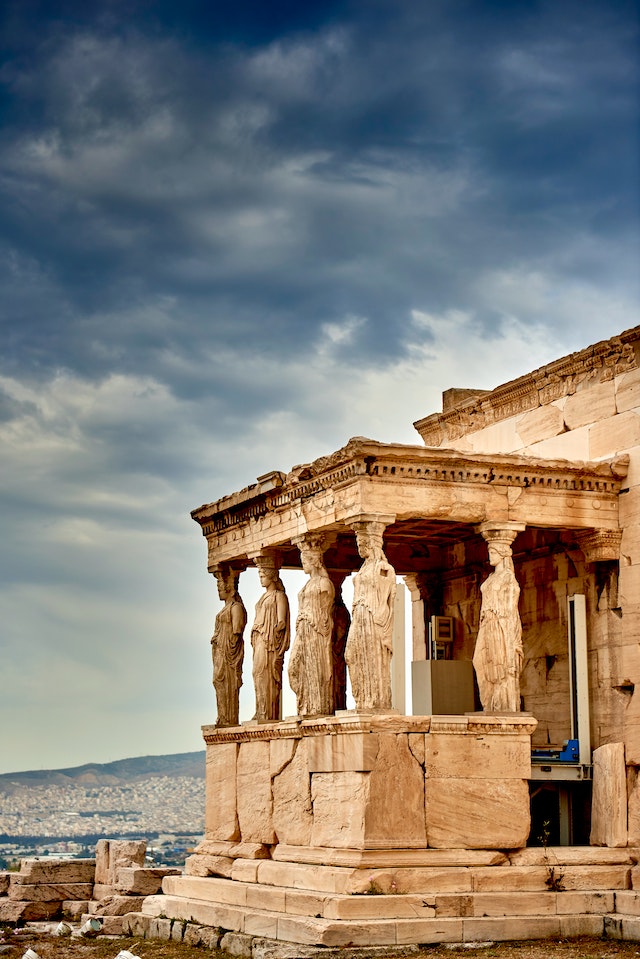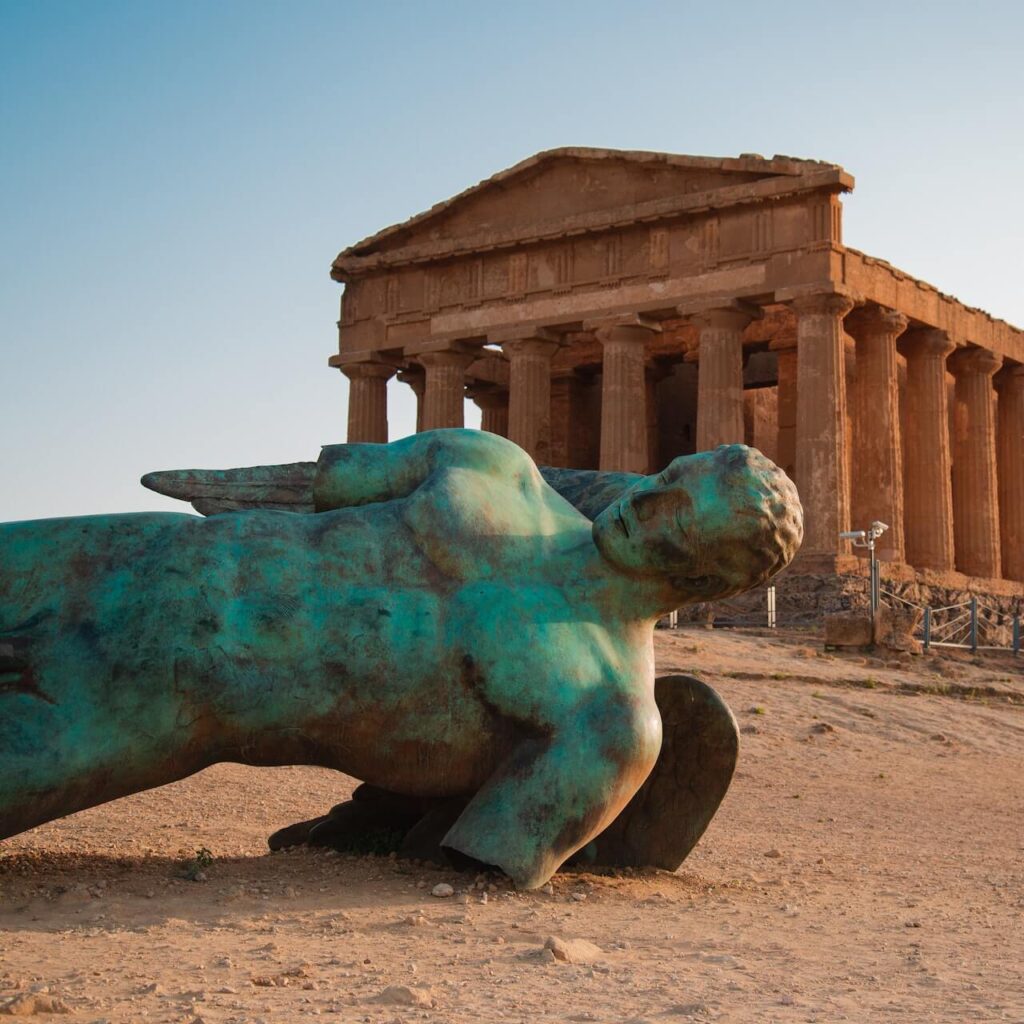The transition from prehistory to history began with writing. Though the beginning of recorded history greatly varies from culture to culture.
Sumerians were the first civilization to record the history of their rulers and their laws in cuneiform writing (a pictographic language similar to hieroglyphs) around 3,400 and 3,300 BC. Later, Egyptians adopted writing around 3,200 BC.
However, the limits between prehistory and history are not well-defined. Many scholars believe that history began with Herodotus, “the father of history.” Herodotus wrote The Histories, a book that started the study of historical records to “prevent the traces of human events from being erased by time.”

Herodotus by Gerd Eichmann. Public domain.
In fact, he was the first historian of the Western world with the history of the Greco-Persian Wars… And it marked a milestone in history recording. His books were the first time someone tried to record history as it happened, listening to oral histories and taking notes.
The first battle of Western history completely recorded in the sixth book of The Histories was the Battle of Marathon.
The Persian Empire wanted to expand to the west and conquer Greece. They controlled several Greek city-states… But, Athens tried to get rid of the Persian influence on the Hellenic world.
Athens in its Golden Age had more years of war than of peace – and they were always prepared for war. Men were habituated to violence and they couldn’t bear a quiet life!
On the other side, King Darius of Persia was determined to punish the city of Athens for its rebellion – and he ordered his servants to remind him every day that he had to punish the Athenians while sitting on his throne.
Thus, in 490 BC, the Persians mobilized a great army to invade Athens. They aimed to make Athenians pay tribute to the Persian empire. Darius led the Persians to the beaches of Marathon (near the city of Athens)… And knowing that the Persians were approaching, Athenians sent his best runner, Philippides to Sparta asking for help.

Photo by Josiah Lewis
The Spartans replied they will help Athens, but not now because according to the laws of Sparta, they had to wait for the full moon to go to battle… and they didn’t want to break the Spartan law. So, the Athenian army was alone against the mighty Persian army.
The Greek commander, Miltiades had approximately 10,000 soldiers to send to the Marathon fields… And he decided to strategically place his troops on the top of a hill where they could see the enormous Persian army of approximately 600 ships carrying 25,000 men under the command of Admiral Datis.
The Persian army disembarked on Greek soil without resistance as the Athenians didn’t want to start the battle and risk their army. They remained on the hill for days, waiting for Spartan warriors to come.
Meanwhile, both armies had minor skirmishes. The Athenians were doubtful about marching out onto the open plain, where the Persians had horsemen and archers waiting to attack.
On the other side, the Persians didn’t dare to attack the defensive position of the Athenians on the mountainside because they will have a disadvantage and it would produce too many losses.
Additionally, the Persian Admiral, Datis, knew that Spartan reinforcements could arrive to support the Athenians… So, the Persians decided to act. They embarked the horsemen to Athens, which was unprotected. Just children and women were in the city, praying to the goddess Athena to protect their brothers, sons, and husbands.
This Persian movement was brilliant!
Admiral Datis strategically accelerated the battle because, without the horsemen, the Greeks would take the risk to attack the Persian infantry and, in case they don’t fight, Athens will burn and their sons, daughters, and wives will die – and the survivors would be sold as slaves. It was a clear invitation to fight on the plains!
General Miltiades realized they had to act as soon as possible. And finally, he abandoned his strong defensive position and face the Persian army. The Greek army slowly went down the hill… And both armies were facing each other. The space between armies was short.
And the Persians, seeing that the Greeks were advancing, shot their arrows. The Athenian troops took up their shields and advanced under a rain of arrows that blocked the sun.
The Persian archers were deadly, and Athenian phalanxes were exposed to the devastating Persian arrows. They noticed they had no choice – and the Greeks did the unthinkable. They approached the Persian army protecting themselves with their shields under various discharges of arrows until they were close enough, and they ran the last meters to cross the death zone, where the Persian’s arrows were deadlier.
The Persians were surprised that the Athenians survived their rain of arrows… And they didn’t have a backup plan. So, Athenian warriors started running to charge the Persian army and fight hand to hand. The bloodbath was about to begin.
Greeks were killing thousands of Persians with their spears… But after a while, Persians broke the center of the Athenian formation, killing dozens of Greeks. The Persians broke through the center, but the Greek troops on both flanks wheeled inward and surrounded the enemy forces, who were then massacred almost completely, one by one, surrounded by a wall of spears.
Some Persian troops could escape. The retreat was the only way out and they ran desperately toward the ships to escape from the carnage. Many were drowning in the sea and others reached the ships to sail back to Persia, leaving thousands of corpses on the Marathon battlefield.
In the end, when the fallen were counted, there were fewer than 192 Greek casualties and Persian losses totaled over 6,400.
This battle secured Athens and inspired a cultural flowering in the Western world and even helped to start the disciplined study of human events, and history.
Featured image: Photo by Paolo sbalzer
Mario Samuel Camacho
Mario Samuel Camacho is a full-time copywriter and content writer. For the past 5 years, Mario has been constantly learning in a quest to better himself and those around him.
He aims to help people fulfill their dreams through his expertise.
